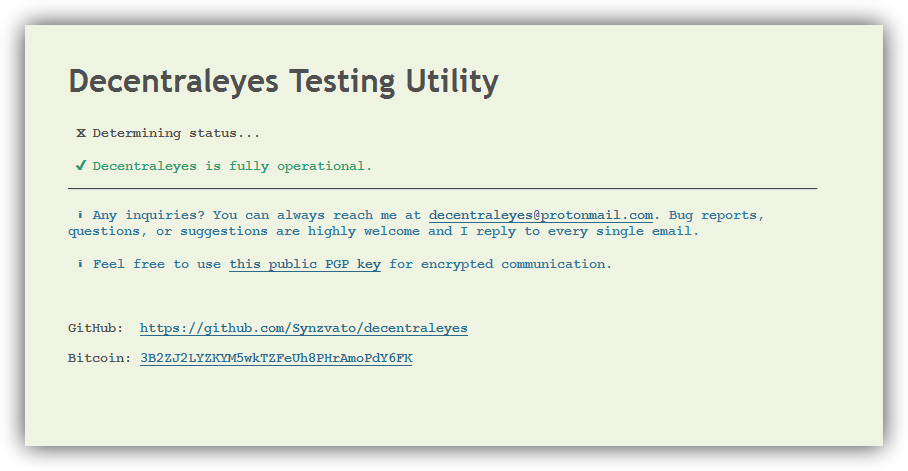by Max Wilbert / Deep Green Resistance
- Even if a resource is not locally available, Decentraleyes offers improved protection by stripping optional headers from intercepted CDN-requests. This keeps specific data, such as what page you are on, from reaching delivery networks. Whitelisting a domain does not affect this measure.
- Even if a resource is not locally available, Decentraleyes offers improved protection by stripping optional headers from intercepted CDN-requests. This keeps specific data, such as what page you are on, from reaching delivery networks. Whitelisting a domain does not affect this measure.
- Decentraleyes for Firefox does not only prevent this nuisance, but it also protects you from trackers, banners and popups that record various information about your browsing habits at the same.
Make Microsoft Edge your own with extensions that help you personalize the browser and be more productive. Decentraleyes was designed to complement all kinds of other privacy-enhancing extensions including, but surely not limited to: Cookie AutoDelete, Disconnect, HTTPS Everywhere, NoScript Security Suite, Privacy Badger, RequestPolicy Continued, uBlock Origin, and uMatrix.
Lately, I have been writing a series of introductory articles on the importance of skills and equipment for revolutionaries. Part of my thesis is that gaining skills and gathering equipment is important not only for practical reasons, but also because it opens up new possibilities and removes barriers in our thinking that we didn’t even know were there.
The situation is similar when it comes to digital communication.
We all know that we live in a world of ubiquitous surveillance. Most of us walk around every day with a phone in our pockets that is constantly tracking our location and sending that data to corporations, who bundle it and sell it to the highest bidder. All our web traffic is monitored and recorded, as are our phone calls, text messages, emails, video chat calls, and so on.
Political dissidents are an especially high-priority target.
Decentraleyes Edge
This surveillance leads to a form of self-censorship whereby we don’t discuss important topics essential to developing resistance organizations and planning and carrying our revolutionary actions.
The only final solution is to dismantle the surveillance system and the institutions (capitalism, patriarchy, empire-culture, civilization) that depend on and lead to it. But pending that outcome, we can fight back in other ways. Here are a series of concrete recommendations for upping your privacy and security game.
Once again, this is an introduction to this topic, and isn’t meant to be comprehensive. Do your own research and be cautious.
Use a VPN or Tor for everyday web browsing
A VPN, or Virtual Private Network, adds a reasonable level of privacy and security to everyday web browsing. Look for a well-regarded platform that doesn’t keep any logs and is not based in the United States or in the territory of close allies. These are cheap and essential in the age when net neutrality is dead, and one subscription can work for multiple devices (laptop, tablet, phone, etc.). Take one hour to purchase and start using a VPN as a priority action.
To bring your security to a higher level, use Tor Browser. Tor is not only essential for high risk online activities, but for normalizing privacy for everyone using the web. It’s easy to use side by side with your regular web browser.
Encrypt data
Almost all phones, tablets, and computers now have simple disk encryption built-in. Enable this function on all your devices. Use strong passwords/passphrases. If you have a habit of forgetting passwords, use a password manager to organize your data. Don’t use the same password for multiple accounts.
Use secure chat/call apps

Today there are multiple easy-to-use, free apps for encrypted communication. These include Signal and Wire. Download these apps and use them instead of standard phone calls, text messages, and video chat whenever possible. These apps are well-regarded in the professional security community and your data should be inaccessible to eavesdroppers.
Keep your devices secure
All your encryption is worthless without physical security. If you leave your computer sitting in a hotel room, a state agent can gain access, open your computer case with a screwdriver, and install a keylogger inside. Next time you login, that device can send your passphrase to the agent, and your security is compromised.
This is just one example of a physical attack.
Keep your devices inside your control at all times. Don’t let strangers or people you don’t trust fully use your devices. If the state does gain access to your device, consider keeping that device disconnected from the internet, wiping all your data, selling it, and buying a new one (as I did after my laptop was searched at the U.S./Canada border).
Don’t share all location data
As I mentioned above, all cell phones (including “dumbphones”) track your exact location any time there is service, and share that information with your service provider and any partners/law enforcement agencies. Consider as well that most smartphones have ~6 microphones in them.
The solutions to this are simple. First, consider leaving your phone at home or in another location. Leave it off as much as possible, and in the bottom of a bag or other location where sound is muffled and eavesdropping is not possible. It is not overkill to purchase a “faraday bag” which blocks all radio waves in and out of your device. These can be purchased cheaply and allow you to carry your phone with you privately, only removing it in innocuous locations when you wish to use it.
Cover cameras
Any cameras in internet/cell-network connected devices can be hacked. Cover them with tape or stickers unless they are actively in use.
Other recommendations
Corporations sell data and provide it to government agencies without warrants or probable cause regularly. In general, your data will be much safer if you use non-corporate products, or only corporate products that are zero-data services.
For example, use Firefox (with privacy-enhancing add-ons such as uBlock Origin, Decentraleyes, Disable WebRTC, HTTPS Everywhere, Privacy Badger, NoScript, etc.) instead of Chrome or Safari. Use OpenStreetMap instead of Google Maps. Use DuckDuckGo instead of Google for search.
Conclusion
As I’ve already said, this is just a beginning. While these recommendations will help improve your privacy, they are not foolproof. Attacks and defense methods are always changing. However, the weakest link in most secure computer systems is the human element. Install software updates, use methods recommended by trustworthy privacy advocates, and use common sense. Remember that the goal here is freedom of action, not perfection.
Additional resources:
| Original author(s) | Thomas Rientjes[1] |
|---|---|
| Stable release | |
| Repository | git.synz.io/Synzvato/decentraleyes |
| Written in | Javascript, HTML, CSS |
| License | Mozilla Public License 2.0[2] |
| Website | decentraleyes.org |
Decentraleyes is a free and open-source browser extension used for local content delivery network (CDN) emulation. Its primary task is to block connections to major CDNs such as Cloudflare and Google (for privacy and anti-tracking purposes), and serve popular web libraries (such as JQuery and AngularJS) locally on the users machine.[3] Decentraleyes is available for the Microsoft Edge, Mozilla Firefox, Google Chrome, Pale Moon and Opera web browsers.[4]
Overview[edit]
Decentraleyes is bundled with 14 Javascript libraries; AngularJS, Backbone.js, Dojo, Ember.js, Ext Core, jQuery, jQuery UI, Modernizr, MooTools, Prototype, Scriptaculous, SWFObject, Underscore.js, and Web Font Loader. It can locally redirect connections to the Google Hosted Libraries, Microsoft Ajax CDN, CDNJS (Cloudflare), jQuery CDN (MaxCDN), jsDelivr (MaxCDN), Yandex CDN, Baidu CDN, Sina Public Resources, and UpYun Libraries networks.[5] With these bundled resources in the software package, they are served to the user locally from their machine, as opposed to from a server.[6] The blocking of connections to these CDNs is claimed (by Softpedia) to result in faster loading times for the end user.[7]
Decentraleyes Reddit
Reception[edit]
Lifehacker has recommended Decentraleyes as a solution to help prevent the user's data from being tracked by Google.[8] CloudPro, a UK-based cloud computing resource, endorsed Decentraleyes as a way of blocking malicious man-in-the-middle CDN attacks.[9]
History[edit]
Decentraleyes was first released in late 2015, compatible with the Firefox browser.[10]
Between 2016 and 2017, a spinoff extension called LocalCDN was created. It brought the functionality of Decentraleyes to Chromium based browsers, for which it was not available at the time (until later that year).[11][12]
Decentraleyes Review
Decentraleyes was rewritten from scratch in October 2017, for version 2.0.0. The software was rewritten to comply with the new Firefox browser add-on standards, and also included other fixes such as a more consistent user interface and more support for right-to-left languages.[13][14]
References[edit]
Decentraleyes Addon
- ^Rientjes, Thomas. 'Synz Solutions'. synz.io. Retrieved 6 June 2020.CS1 maint: discouraged parameter (link)
- ^'LICENSE.txt · master · Thomas Rientjes / decentraleyes · GitLab'. git.synz.io. Retrieved 6 June 2020.CS1 maint: discouraged parameter (link)
- ^Colby, Clifford (22 August 2018). 'Stay private and protected with the best Firefox security extensions'. CNet. Retrieved 6 June 2020.CS1 maint: discouraged parameter (link)
- ^'Decentraleyes - Local CDN Emulation'. decentraleyes.org. Retrieved 6 June 2020.CS1 maint: discouraged parameter (link)
- ^'Decentraleyes - Free Software Directory'. Free Software Foundation. Retrieved 6 June 2020.CS1 maint: discouraged parameter (link)
- ^Williams, Dwen (1 February 2016). 'Take privacy one step further and use this extension to block content delivery networks'. The Next Web. Retrieved 6 June 2020.CS1 maint: discouraged parameter (link)
- ^'Decentraleyes Firefox Add-On Speeds Up Page Loads by Emulating CDNs Locally'. Softpedia News. 30 March 2016. Retrieved 6 June 2020.CS1 maint: discouraged parameter (link)
- ^Hesse, Brendan (14 February 2020). 'Mozilla's New Firefox Android App Only Supports These Extensions For Now'. Lifehacker. Retrieved 6 June 2020.CS1 maint: discouraged parameter (link)
- ^Clark, Steve (1 November 2018). 'How to immunise your browser against the latest security threats'. cloudpro.co.uk. Retrieved 6 June 2020.CS1 maint: discouraged parameter (link)
- ^Brinkmann, Martin (23 November 2015). 'Decentraleyes for Firefox loads CDN resources locally'. Ghacks. Retrieved 6 June 2020.CS1 maint: discouraged parameter (link)
- ^Brinkmann, Martin (15 February 2017). 'Local CDN for Chrome'. GHacks. Retrieved 6 June 2020.CS1 maint: discouraged parameter (link)
- ^Fray, James (2016-12-01). 'first commit'. Local CDN’s Git repository.
- ^'Release v2.0.0 · Synzvato/decentraleyes · GitHub'. github.com. Synzvato. Retrieved 6 June 2020.CS1 maint: discouraged parameter (link)
- ^'Decentraleyes version history - 14 versions – Add-ons for Firefox (en-US)'. addons.mozilla.org. Retrieved 6 June 2020.CS1 maint: discouraged parameter (link)

Decentraleyes Wiki
External links[edit]
- Official website
Decentraleyes Firefox
